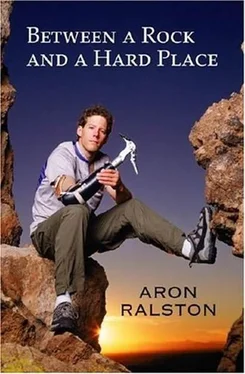Must be the sleep deprivation. It’s making you dumb.
Yet another breeze brushes past me on its way to the Big Drop, stripping me of what little warmth I have. Later in the afternoon like this-or early in the evening, I guess-the winds come more frequently, and a crispness anticipates the arrival of night.
My gumption for chipping at the boulder is gone. I continue with the fruitless effort solely to stimulate my metabolism and push into the background the shuddering weakness brought on by the chilly winds. Even still, I work only a fraction as much as I did yesterday. I’ve already acknowledged the inutility of hacking at the chockstone, but some irrational part of my brain hasn’t yet acquiesced to the helplessness of my situation. It insists that if I work harder and take fewer breaks, I will eventually get free. I rationalize my lethargy with the impossible thought that I don’t want to get free with night approaching-I could stumble right off the Big Drop rappel in the dark, or get lost in the lower canyon.
Like you’re going to get free. You’re lazy and you know it. You’re in the fight of your life-a fight for your life, no less-and you’re too lazy to get over a little fatigue and do some work. You slothful waste. You’re killing yourself here. You’re going to die.
There it is, my prognosis in black and white, like an X ray held to the light. I have a terminal condition. Without being able to meet the needs of my body, I can expect to live another day and a half, perhaps. Or two days, but what would that matter? No expectation had prepared me for this tormenting anxiety of a slow death, thinking about whether it will come tonight in the cold, tomorrow in the cramps of dehydration, or the next day in heart failure. This hour, the next, the one after that. Anytime I’d come close to death before, it had been in the context of a flashing crisis, a dramatic vision. Whether the circumstance was experienced or envisioned, the chop came as an executioner’s blade, fast as gravity in the form of a falling ice block, a smothering avalanche, a failed self-arrest, a peeling backflip from high on a rock face. I knew my last sounds wouldn’t be any profound passing of wisdom but a muttered “Oh shit,” maybe the thought “This is it,” and a crushing exhale, a spattering of blood, crunching bones. I’d never imagined fading in a protracted departure. I figured I could handle just about anything that would provoke a drawn-out struggle: fighting through a storm; finding my way when I was lost; dragging my body back from injury or illness. No, I wouldn’t sit down to dinner with death, talk introspectively over a lengthy visit, and end on “Well, that’s it, then, guess it’s time to go.”
I had been lucky so many times that even the glimpses of my final destiny had become a toy I played with to bring on a certain intense feeling, the ultimate contrast between the fear of immediate doom and the desire to live fully. I think some people would consider these the thoughts of an adrenaline junkie, but I relished more the control of my adrenaline than the ride it would give me if I unleashed it. On less dangerous but still adventurous trips, I pushed my limits for endurance, engaging in prolonged experiences of cathartic suffering to break down my interior walls, to cleanse my spirit for purer emotions than boredom and stress, and to surpass myself. Periodically, I would have a euphoric realization taking me beyond the filters of my brain, in which I understood that the fear and the pain existed only in the gap between a pair of neurons. I called it getting over myself. How I will get over myself now, in this canyon, is beyond any perceived powers of mind over matter I think I have-my situation is physically impossible to overcome. I am over the pain, I have the discipline to survive the fear, but I can’t get over my body’s need for water.
Water. I pick up my charcoal-gray Nalgene bottle and swirl the precious contents. For the last day, I’ve been sipping about two ounces every three hours. Hmmm. That means the ten ounces I have left will get me through tonight. I need it to last longer than that. It’s after six P.M., but I haven’t had any water since I put away my video camera at three-fifteen. I should skip it this time, save it for later. I feel all right, I guess. My tongue isn’t unusually swollen or squishy or hard. My lips feel normal, too. I’m thinking about water fairly frequently, but maybe this stage of dehydration is like that part of fasting when I’ve thought I would die if I didn’t eat soon, but after another half a day, the disrupting fantasies of food ceased and my hunger dissipated. Somehow I doubt thirst is like that. I bet this is just the beginning.
Whatever. Quit thinking about it; put the Nalgene away somewhere. Stick it in the sand so you’re not staring at how much you have left. Better yet, do something. Get yourself ready for night.
Yes, it’s better to focus on my plan. I put my Nalgene below the chockstone in the sand and consider the coming evening. It will be pitch-black at nine P.M., and then there will be nine hours of darkness. I know it’s only nine hours, but especially when I’m not producing internal heat, it will last like a polar winter. I’ll sip at nine, midnight, three, and six A.M. I’ll take smaller sips than last night; that will conserve more for tomorrow. I’ll need it to eat the rest of my burritos. That first bite three hours ago was so dry it turned to pasty glue in my mouth; the rest will only be worse. OK, then, that’s what I’ll do.
That leaves me with the question of how I’ll stay warm. The air seems colder than it was this time yesterday. There were a few more layers of clouds passing by today, keeping the temperature lower. But now the clouds are gone, and there’s nothing to insulate me once the sun goes down. One of the few laws of heat transfer I recall from engineering classes is that radiation, or emissive heat loss, between a ground source and the night sky is proportional to the temperature difference raised to the fourth power. If I remember correctly, space is about 400 degrees Kelvin colder than my body. Take that to the fourth power, multiply it by a little constant I’ve forgotten, and that’s still like twenty-five billion units of whatever. The bottom line is, I’m emitting a lot of heat into the sky. I’ll need to do a better job of keeping myself warm tonight, especially since I won’t be working as much. I’m just going to make it through to the morning and then worry about what’s next.
Taking off my pack, I fish out the small black cloth sack in which I stowed my digital camera. Holding the sack’s open end in my teeth, I take my knife in my left hand and punch out the stitched end of the bag, trying to keep from stabbing myself in the face. The lightweight material tears easily, and I thrust my left forearm into the fabric tube. Tugging with my teeth, I pull the closer end of the sack up over my elbow, creating a makeshift long sleeve for my left arm. I dismantle the runners from their spot in my pulley station and retie two more lengths of purple webbing around my right arm, pulling the strands between my forearm and the wall where I can’t situate the insulated CamelBak. Also from my anchor system, I take in my teeth the extra length of yellow webbing and, applying tension against the tied-off loop, slice off a five-foot strand with my knife. I put the remaining two thirds of my first burrito in my left pocket, drop the unopened whole one into the bottom of my backpack, and wrap my right biceps in the plastic grocery sack that I was using to store my food. I tie off the plastic bag with the yellow webbing and have a long sleeve for my right arm, too.
Now to do the same for my lower half and somehow make pant legs out of the remaining 170 feet of my climbing rope. The dirty green and yellow line lies in a heap on the rock shelf in front of my knees. It takes me twenty minutes for each leg, but I manage to wrap them both from my thighs to my socks with about thirty neat loops of rope. I laugh at myself. The ropes stack like coils of potting clay; it looks like I’ve been attacked by two identical half-inch-thick green pythons. The coils gather and pinch at my knees when I sit in my harness, so I loosen them and make an adjustment on the daisy chain fixing me to the anchor, lifting me two inches higher in my seat. This is the most comfortable I’ve been since I was trapped.
Читать дальше












